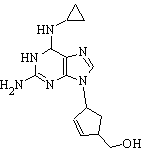A new drug that can help reduce the amount of human immunodeficiency virus when combined with other anti-HIV medications has received approval from FDA.
Ziagen (abacavir), approved last December, is taken twice daily to treat HIV, a virus that mutates rapidly and may become resistant to current treatments. The drug, one of a class called nucleoside analogue reverse transcriptase inhibitors (NRTIs), is approved for adults and children older than three months.
The drug, however, has been associated with a potentially fatal allergic reaction in at least 5 percent of patients. Possible symptoms include skin rash, fever, nausea, abdominal pain, and severe tiredness. Patients experiencing such a reaction should stop taking the drug and call their doctors right away. Ziagen should not be taken again after a reaction occurs because more severe symptoms could arise within hours that may include life-threatening low blood pressure or death.
Physicians can register patients developing symptoms of hypersensitivity by calling 1-800-270-0425.
All NRTIs can cause lactic acidosis, a fatal metabolic disorder that causes an abnormal buildup of lactic acid. Symptoms may include an enlarged liver. Other reported side effects of Ziagen include nausea, vomiting, fatigue, headache, diarrhea, and loss of appetite.
Ziagen received accelerated approval, and, at present, there are no results from controlled trials showing the long-term effectiveness of Ziagen to suppress HIV infection or AIDS.
Ziagen is marketed by GlaxoWellcome Inc., Research Triangle Park, N.C.
COPYRIGHT 1999 U.S. Government Printing Office
COPYRIGHT 2004 Gale Group



